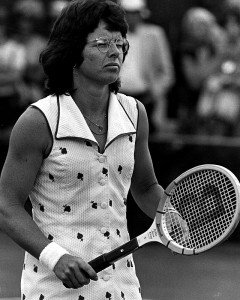by Miho Shirai
Billie Jean King showed how women’s power could change society and helped to overcome sexual discrimination in tennis. She is the one of the most well known tennis players because of her long tennis career. Also, she built the women sport foundations in the United States. Billie Jean King won a total of 39 Grand Slam titles during her career and became the first female tennis player to earn $100,000 in a year in 1971. She founded a sports magazine for women called “Women Sports†and also established “The Women’s Sport Foundation.†She also created a business to fight against sexual discrimination. King fought against discrimination of women by demonstrating women’s strength and by establishing organizations that supported female tennis players.
Billie Jean King was born on November 22nd, 1943 in Long Beach California. Her family lived the American dream of a large home and a nuclear family life. Her father was a fire fighter and a disciplinarian. Her mother was the peacekeeper in the family, and treasured family time. It would be connected with King’s success. King’s mother attempted to introduce Billie to sewing and embroidery but she was not interested in these traditional female accomplishments. When a fifth-grade classmate named Susan Williams introduced her to tennis, she immediately fell in love with the sport. After her first tennis lesson on a Long Beach public court, she had already decided to be the Number one tennis player in the whole world. When King was 17-years-old, she paired with Karen Susman who was 18-years-old. They participated in “The Championships Wimbledon 1961†and became the youngest pairs champions. In 1963, King went into singles for the first time but finished second. Finally, she became a champion of singles for the first time in 1966 and won the Championship in three consecutive sessions. At this time, there was an issue. Women players received much less prize money than men so King grappled with the problem of prize money differences according to sex.
Billie Jean King won a match that helped to fight against discrimination and uphold the honor of women. The “Battle of the Sexes†match changed women’s position in tennis. This match caused a big revolution in women’s sports in American society. In the 1960s and 1970s, there was a wage gap between the sexes. In tennis, women players received much less money than men. Looking at prize money clarifies this actual situation. In 1968, at Wimbledon, Rod Laver received $4,800 for his victory, while Billie Jean King only got $1,800. In 1970, the Pacific Southwest Open tournament offered a top prize for men of $12,500 and $1,500 for women. At that time, King was tackling the problem of prize money difference due to sexual difference. Then Bobby Riggs offered to fight King in a tennis match but Billie declined. Riggs was one of the top-ranked American players in the 1930s. He was 55 years old when he offered to play a tennis match against King in 1973.  Riggs then went after Margaret Court, the Australian player then ranked number one in the world.  Eventually, Court lost the match against Riggs. As soon as King heard the results, she knew that she had to play Riggs to uphold the honor of women so she agreed to the match against Riggs. In this tennis match, she controlled the tempo and defeated Riggs. “It would have been an embarrassing, indeed humbling affirmation of the old stereotypes that women at the time were trying to upend.†The battle of the sexes was an opportunity to bring attention to sexual discrimination.
Billie Jean King tried to overcome sexual discrimination. She chose to fight by a founding a sports magazine, “Women Sportsâ€, in June 1974. Ninety-eight percentage of readers were women and three quarter of them were between the ages of eighteen and thirty five. This magazine provided a discussion of issues, biographies of women athletes and offered a guide to athletic scholarships for women.  It became popular magazine. In January 1979, “Women Sports†was renamed “Women’s Sports.â€Â “It engaged more and more women to discover for themselves the added dimensions that participation in active sports can bring to their lives.†Billie Jean King also took another step to fighting discrimination and established “the Women’s Sports Foundation†in 1974. The main object was to expand and protect athletic opportunities for women and girls. This organization grew every year and got support of sponsors and individual donors. Billie Jean King’s magazine “Women’s Sports†and the women’s Sports Foundation contributed to a revolution in women’s sports.
In the late 1960s and early 1970s the idea of modern feminism entered America and began to change women’s lives in revolutionary ways. “Billie Jean King profited from this new climate for women in fundamental waysâ€: she built a career as a professional player, she defeated Bobby Riggs and upheld the honor of women.
Also she created a business magazine “Women’s Sports†to engage more womento participate in active sports and “the Women’s Sport Foundation†to expand and protect athletic opportunities for women and girls. “Billie Jean King’s efforts opened doors not just for women in sport but for women to be able active in society as a whole.â€
Further Reading
Susan Ware. Game, Set, Match: Billie Jean King and the Revolution in Women’s Sports. Chapel Hill: University of North Carolina Press, 2011.
Miho Shirai is a second-year student in the Department of British and American Cultural Studies

